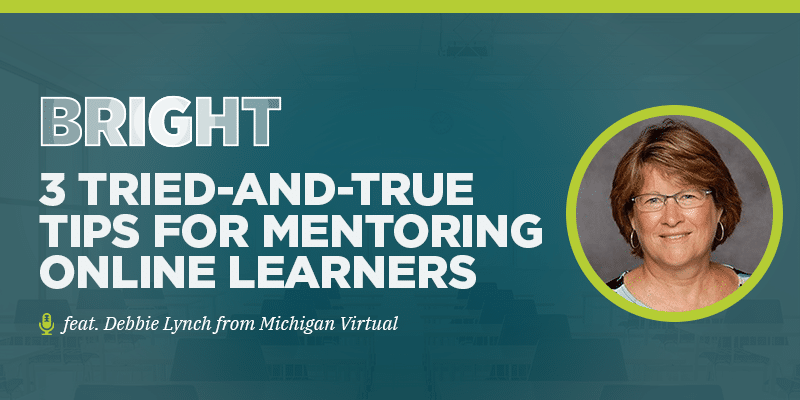Or listen on Apple, Spotify, Google, or another platform. Alternatively, you can read along with the transcript.
Research has shown that online students are twice as likely to succeed if they have a dedicated mentor.
According to Debbie Lynch — outreach coordinator for mentors at Michigan Virtual — a mentor is someone who provides a personal connection to students who are learning virtually.
In the State of Michigan, schools are required to provide a mentor for every student who chooses to take an online course.
Unlike online instructors who are content experts, mentors help students stay on track and master the skills required for self-directed learning.
“Mentors are the liaison between the student, parent, and online teacher,” explains Debbie. “They are an advocate for the student, but they are also the person that teaches the student to be an advocate for themselves.”
A student might ask their online teacher questions about assignments, course content, grades, or feedback they’ve received. By contrast, mentors typically help students practice time-management skills and stay motivated throughout their coursework.
In this episode of the BRIGHT podcast, Debbie shares:
- Stories from her many years as a mentor of online learners,
- Why having a dedicated mentor makes students twice as likely to succeed in their online courses, and
- Three tried-and-true tips for supporting online learners as a mentor.
Here’s a sneak peek at our conversation:
You can listen to my conversation with Debbie using the audio player above or by subscribing to the BRIGHT podcast in your app-of-choice (find us on Apple, Spotify, Google, and more) or by reading along with the transcript.
Of course, we understand that educators are busier than ever. If you don’t have time to listen to Debbie’s full episode (which offers the fuller effect of her wisdom, energy, and examples), you can still benefit from a glimpse at her top three tips below!
3 tried-and-true tips for mentoring online learners
#1. Keep your focus on relationship-building
According to Debbie, relationship-building is the foundation of successful mentoring.
At the beginning of the academic term, it’s important, she says, beyond all else, to set expectations and show students that you care.
“Be sympathetic and encouraging, especially for those students who aren’t doing well,” says Debbie. “They need your support. They don’t need someone getting upset with them. You need to be flexible and patient.”
Debbie has been in education for 40 years. For the first 33 years, she taught business and computers. Later, she became the online learning coordinator at her school, helping students register for online courses and serving as their mentor once they enrolled.
For one class period per day, students would meet in one of the school’s computer labs. While students worked independently, Debbie would walk around the lab to support them. Still, she set aside time to meet with each student individually once per week to check in on their progress.
It can be helpful, she adds, to ask students, “What does success look like for you?” and “What do you need to be successful?” Often, students haven’t considered the answers to these questions, and asking them can lead to a productive conversation.
At the end of the day, it was most important to Debbie that online learners felt comfortable, welcomed, and supported in her classroom. Mentors play a critical role in fostering this kind of supportive learning environment for online students at their schools.
“When kids know you care about them,” she adds, “they’ll do pretty much anything for you.”
#2. Communicate with your online students at least once per week
Whether your students are meeting with you at your school building or virtually, Debbie says communicating with them at least once a week is crucial.
This communication could take many different forms. “It doesn’t have to be Zoom or Google Hangout or face-to-face,” she says. “It could be through email or texting, whatever the students are comfortable doing.”
Mentors also often act as liaisons between parents, students, and online instructors.
Debbie used Remind.com to send periodic updates to students and parents, reminding them to look over their pacing guides.
It’s also helpful to let online instructors know if something is going on in a student’s life that prevents them from completing their coursework. For example, if they were absent with a prolonged illness, it wouldn’t hurt to let the student’s online teacher know why they may not be logging in as often.
By keeping everyone on the same page, mentors add extra layers of accountability into self-paced online learning environments and help their students stay on track to succeed.
You can find many free resources on mentoring online students — including example communication templates — at michiganvirtual.org/mentors.
#3. Clarify your policies and procedures upfront
As a mentor, it’s critical to be clear about your policies, procedures, and expectations at the beginning of the term.
When Debbie was a mentor, she would start the semester off by walking students through an online course and clarifying her expectations. For example, in her computer lab, she set the expectation that students need to:
- Log into their online course daily
- Read all emails and information provided by their online teacher, and
- Check their pacing guides often.
Debbie would send a syllabus home to clarify her policies and procedures right off the bat. As an added step, she’d have both students and parents sign the syllabus to acknowledge that they’d read it.
It was important to her that both parties took the students’ online course seriously.
“You’re not just coming to the computer room to hang out,” she would tell students. “This is a real class that you’re coming to every single day.”
The rest of the term went much smoother after laying this groundwork during the first couple of weeks.
My favorite quotes from this episode
“Research has shown that students are twice as likely to succeed if they have a dedicated mentor… Taking an online class is a new experience for most students, so having that connection and support from the mentor is just crucial.”
“Mentors are not content experts. That’s what our online teachers are… The mentor is the person that is there to teach students to be self-directed learners, teach them time-management skills, and motivate them to help keep them on pace so they’ll be successful. They’re like the cheerleader in the background.”
“Even my brightest students struggled with online learning. These weren’t the same students that struggled face-to-face necessarily. Some of those kids did better than some of my students that were getting all A’s in school. You really have to be patient and flexible and meet them where they’re at.”
“Great mentors empower students to make informed decisions, but also to understand the impact of their choices.”
Related resources
- Explore: Mentor resources

